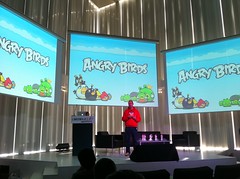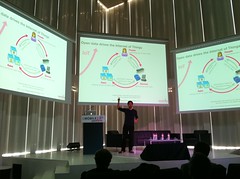Mobile 2.0 Europe, Day 1
Cunningly scheduled the two days before Sonar, Mobile 2.0 has snuck into my calendar for the last few years; and with Rudy knowing everyone in Europe, it's a good opportunity to meet a set of people I don't bump into around London (LIFT is similar, but perhaps more biased towards academia and away from the Mediterranean).
A combination of a late arrival in Spain the night before, an hour or so preparing slides for my talk tomorrow, complicated travel arrangements and pure laziness meant that I missed the very first session. I arrived at the impressive venue (Telefonica R&D HQ, I'm told) to find Peter Vesterbacka of Rovio, proudly displaying a bright plumage of Angry Birds merchandise and talking about their meteoric rise to fame.
 Peter's an old face on the European mobile scene and there's a sense that - much as with Russell Buckley - he's someone who's put the time in and is now reaping his just rewards. He's quite disarming, pointing to the 51 games they released before Angry Birds (which now coasts at 1m downloads a day), and presents Roxio as not a unique success, but rather part of a broader trend: mobile is a good place to build entertainment brands thanks to its wide reach and ability to engage daily. Compare production costs for mobile games with anything that might be produced in Hollywood; look at how Roxio roll out seasonal variants and regular game updates.
Peter's an old face on the European mobile scene and there's a sense that - much as with Russell Buckley - he's someone who's put the time in and is now reaping his just rewards. He's quite disarming, pointing to the 51 games they released before Angry Birds (which now coasts at 1m downloads a day), and presents Roxio as not a unique success, but rather part of a broader trend: mobile is a good place to build entertainment brands thanks to its wide reach and ability to engage daily. Compare production costs for mobile games with anything that might be produced in Hollywood; look at how Roxio roll out seasonal variants and regular game updates.
"We're not a mobile games company, we're a next generation entertainment franchise", he squawks. Rovio were a service business of 12 people (a similar size to FP), who successfully made the move into products. My feathers ruffled by jealousy, I nonetheless enjoyed hearing Peter talk so disarmingly about his business.
A panel discussion followed. Much of it covered well-trod ground (gamification, augmented reality and the importance of context) but the panel covered it well. They were united on the importance of context awareness, Which seems to me to be somewhat similar to targeting of advertising: mining a large amount of raw data, mining it and drawing conclusions from it. Given the internet and mobile advertising industry's failure to deliver on the promise of well targeted advertising over the last 15 years despite the vast amount of data ISPs and operators own concerning their customers, I found it hard to share their optimism about our ability to reliably derive context from sensor data? What will happen here that hasn't happened with advertising? I suspect that deriving anything reliably useful about context from a mass of sensor data is a Really Hard Problem... Though thinking back to Ted Morgan talking about work Skyhook had done in this area in a talk here 2 years ago, there seem to be some opportunities lurking in the short term.
 Usman Haque was up next to talk about Pachube, an amazing service I keep hearing about, getting enthused for, and failing to do anything with. They're am aggregator of sensor data, and Usman presented a stirring and deliberately contradictory Bill Of Rights for the Internet of Things. Definitely worth more attention.
Usman Haque was up next to talk about Pachube, an amazing service I keep hearing about, getting enthused for, and failing to do anything with. They're am aggregator of sensor data, and Usman presented a stirring and deliberately contradictory Bill Of Rights for the Internet of Things. Definitely worth more attention.
Di-Ann Eisnor of Waze followed up with a talk about the participatory city - essentially some use cases for the kind of data that Pachube is gathering, focused around some nice demos of her product. Waze looks to be a journey optimiser, using realtime traffic data to better inform drivers of routes to take.
Another panel: the panelists dwelt a little too long on the role of government in regulating or otherwise facilitating open data for my liking. Not that it isn't an important topic, but I'm more of a nuts and bolts kinda guy. Having spent a few evenings recently watching Adam Curtis' documentaries, I was driven to wonder how helpful it is to employ the metaphor of city as computer. What do we run the risk of losing by viewing our social structures - which aren't digital - through this lens, and how can we avoid losing it? It feels to me that nowadays if we measure something (school grades, say, or NHS waiting times) we are driven to optimise for the thing being measured, at the expense of that which can't be measured (a well-rounded education, say). I wonder if this is a valid concern, or just the first signs of my turning into an old man bemoaning contemporary society?
Coffee, and I'll confess I didn't follow the next couple of talks too closely. Andy Goodman of Fjord Madrid gave a thousand-foot-view of the Fjord view of the world; WorldReader seemed a worthy effort to put e-reading kit into the hands of pupils in the developing world.
AppCircus closed the day, and once again I was struck by how many really nice-looking apps (such as Nomad Analytics, who did a good presentation of what looks like an excellent Blackberry front-end onto Google Analytics) didn't have much of a solid business behind them. Sign of an app bubble, a congenital weakness in European startups, or me missing the point of what AppCircus is? I'm not sure. For me, iscandit stood out as a business with IP, a good-looking product, and some thought as to revenue and likely partnerships.